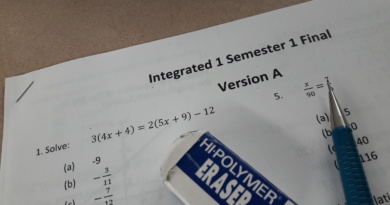Davis High offers students vape recovery program
By Connor Tang,
BlueDevilHUB.com Staff–
Davis High is in the process of improving substance recovery programs for students trying to quit vaping.
“We’ve seen this alarming uptick in students consuming nicotine,” said Laura Juanitas, Director of Student Support Services at the Davis Joint Unified School District. “Until two years ago, the whole smoking culture had really, really decreased. When vapes got introduced, [students are] getting it in flavors that are pleasant and easy to hide, so we’ve seen it grow a lot in the past couple years.”
Addiction is one of the primary challenges facing vape-users across the nation. “It’s grown a lot because students see it as not as dangerous certainly as cigarettes or other drugs,” Juanitas said. Due to its addictiveness, however, many users struggle to last four or more hours without vape, resorting to taking more frequent breaks—such as to the restroom—to use it.
Furthermore, nicotine addiction is linked to worse student performance due to its ability to increase heart rate, raise anxiety levels, and develop into other adverse health effects such as lung cancer and popcorn lung explained DHS nurse Abigail Serin.
Serin offers a personalized first step in addiction rehabilitation. She provides a space for users to discuss their concerns where “I can take this information, providing as much confidentiality as the student requests, to other people to come up with ideas for how to serve the student and get the student the support that is needed.” Serin also coordinates Thought Partnerships with other DHS counselors and the district Wellness and Prevention team that are available to all students. These partnerships ensure a personalized care routine for the best possible recovery.
For students trying to quit, Serin recommends the acronym STIC, meaning Stop (breath), Think, Imagine (the consequences), and Choose. “[It] sounds very simple, but when you have these other reasons that may be clouding your thought process… if that acronym STIC makes you postpone using further and further each time, that can hopefully lead to smarter decisions,” Serin said.
DHS also has a contract with Recovery Happens, a nonprofit organization that provides professional addiction counseling. Their offices in Davis provide group sessions and resources to combat addiction.
Many teachers are passionate about helping their students. “I’ve devoted my life to help others foster their intellectual capacities, and now they’re actively doing stuff that hinders important growth in the important years of adolescence,” English teacher Anthony Vasquez said.
Teachers are also taking an important step in counteracting addiction by educating themselves on the impacts and signs of vape addiction. For example, “Teachers should be letting the office know if students are leaving class often and for a long period of time,” head counselor Catherine Pereira said.
DHS administration is working towards increasing student participation in the campaign against vaping to encourage peer education and creative solutions.
Some students welcome the increased school focus on vaping. “I think it’s good that our school is aware of these problems and is willing to help its students,” sophomore Josh Xu said.
Improving the recovery process for DHS students is a top priority for DHS administration. “We want to make sure they know the resources available to them to help them,” Pereira said. “The choices that students make at a young age have lifelong consequences, and that cannot be understated.”



